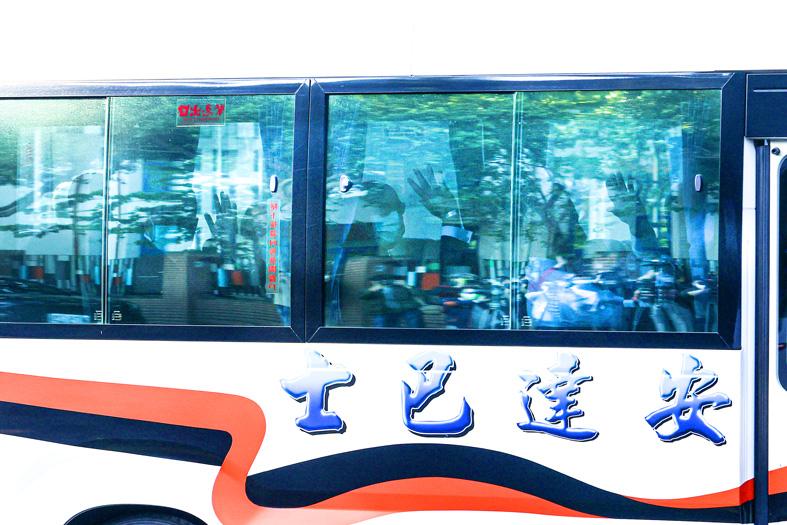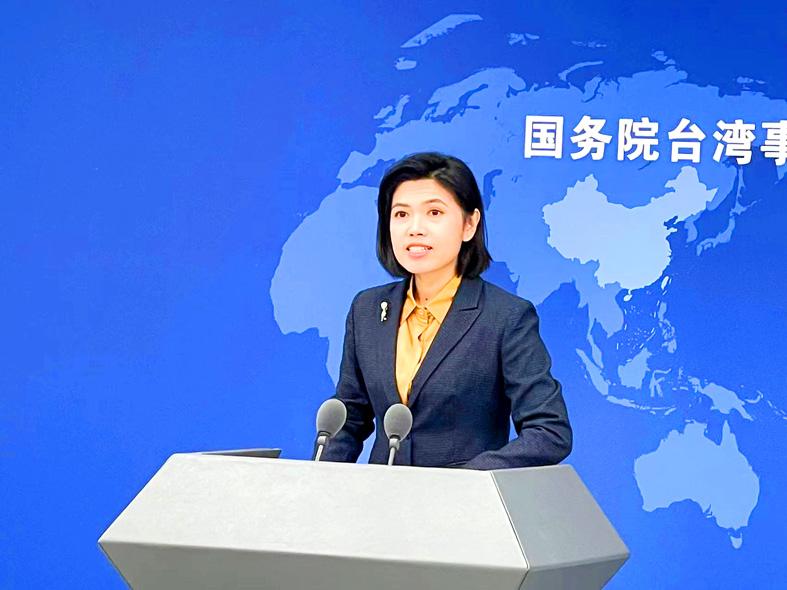A delegation of US lawmakers visiting Taiwan has signaled the “strategic clarity” of Washington’s policy toward Taiwan, and they might visit Japan or South Korea next to promote the US’ Pacific Deterrence Initiative, a military affairs expert said yesterday.
A US Navy C-40A aircraft, reportedly carrying six US lawmakers, on Tuesday afternoon departed from Manila and landed at Taipei International Airport (Songshan airport) later in the day.
The Ministry of Foreign Affairs later on Tuesday confirmed that a group of US lawmakers had arrived in Taiwan, while the American Institute in Taiwan referred reporters to the office of US Senator John Cornyn.

Photo: CNA
Cornyn is one of the US senators who is sponsoring a draft Taiwan Deterrence Act introduced at the US Senate last week.
His office had yet to respond to Taipei Times’ questions about the visit as of press time last night.
Chinese-language media yesterday reported that the delegation met with President Tsai Ing-wen (蔡英文) in the morning and visited the Ministry of National Defense to be briefed on the threat to Taiwan from China.

Photo: CNA
The ministries had no comment on the delegation’s itinerary.
The US military aircraft did not refrain from letting China know it was flying from Manila to Taipei, as it had its flight radar on throughout the flight, the Institute for National Defense and Security Research’s Su Tzu-yun (蘇紫雲) told the Taipei Times by telephone.
Su — who is director of the institute’s Division of Defense Strategy and Resources — was a speaker at a defense ministry news conference on Tuesday, at which it released a national defense report.

Photo: AP
He said that he did not meet the US visitors.
If media reports that the delegation is to remain in Taiwan for three days are true, the airplane would be parked at the airport’s military apron for the duration, which would show Washington’s trust in Taiwan, despite the lack of formal ties, he said.
These signals demonstrate that Washington’s policy toward Taiwan has moved from “strategic ambiguity” toward “strategic clarity,” he said, but added that the government cannot reveal too much about the delegation’s itinerary at this time.
The visit can be viewed as an attempt to boost Taiwan-US cooperation in military affairs, Su said.
Asked if the visit might lead to new arms sales, Su said that US lawmakers would usually not be directly involved in such matters.
Washington’s arms sales to foreign partners have to go through a rigorous process, including a request tendered by the defense ministry, followed by other notification and review procedures, he said.
“If you see our #tanks and #IFVs roaming on the roads, keep calm and carry on. #ROCArmy is conducting quarterly routine #readiness training this week, making sure they have the home field advantage when defending our homeland,” the defense ministry wrote on Twitter yesterday, referring to infantry fighting vehicles.
Pentagon spokesman John Kirby at an informal briefing on Tuesday said that members of the US Congress traveled to Taiwan by military jet, which he said is customary for travel of that kind.
“Kirby noted that congressional visits to Taiwan are relatively common and in keeping with US obligations under the Taiwan Relations Act,” the US Department of Defense said in an online statement.
Beijing said that the “risky and provocative actions” are “doomed to end in failure.”
“Colluding with Taiwan independence forces is a dangerous game and playing with fire will result in burning themselves,” Chinese Ministry of Foreign Affairs spokesman Wang Wenbin (汪文斌) told a news briefing, calling the visit a “clumsy performance.”
Additional reporting by AFP and Reuters

Tropical Storm Gaemi strengthened into a typhoon at 2pm yesterday, and could make landfall in Yilan County tomorrow, the Central Weather Administration (CWA) said yesterday. The agency was scheduled to issue a sea warning at 11:30pm yesterday, and could issue a land warning later today. Gaemi was moving north-northwest at 4kph, carrying maximum sustained winds near its center of up to 118.8kph and gusts of 154.8kph. The circumference is forecast to reach eastern Taiwan tomorrow morning, with the center making landfall in Yilan County later that night before departing from the north coast, CWA weather forecaster Kuan Shin-ping (官欣平) said yesterday. Uncertainty remains and

SEA WARNING LIKELY: The storm, named Gaemi, could become a moderate typhoon on Wednesday or Thursday, with the Taipei City Government preparing for flooding A tropical depression east of the Philippines developed into a tropical storm named Gaemi at 2pm yesterday, and was moving toward eastern Taiwan, the Central Weather Administration (CWA) said. Gaemi could begin to affect Taiwan proper on Tuesday, lasting until Friday, and could develop into a moderate typhoon on Wednesday or Thursday, it said. A sea warning for Gaemi could be issued as early as Tuesday morning, it added. Gaemi, the third tropical storm in the Pacific Ocean this typhoon season, is projected to begin moving northwest today, and be closest to Taiwan on Wednesday or Thursday, the agency said. Today, there would likely

DISRUPTIONS: The high-speed rail is to operate as normal, while several airlines either canceled flights or announced early departures or late arrivals Schools and offices in 15 cities and counties are to be closed today due to Typhoon Gaemi, local governments announced last night. The 15 are: Taipei, New Taipei City, Taoyuan, Tainan, Keelung, Hsinchu and Kaohsiung, as well as Yilan, Hualien, Hsinchu, Miaoli, Chiayi, Pingtung, Penghu and Lienchiang counties. People should brace for torrential rainfall brought by the storm, with its center forecast to make landfall on the east coast between tonight and tomorrow morning, the Central Weather Administration (CWA) said. The agency issued a sea warning for the typhoon at 11:30pm on Monday, followed by a land warning at 11:30am yesterday. As of

CASUALTY: A 70-year-old woman was killed by a falling tree in Kaohsiung as the premier warned all government agencies to remain on high alert for the next 24 hours Schools and offices nationwide are to be closed for a second day today as Typhoon Gaemi crosses over the nation, bringing torrential rain and whipping winds. Gaemi was forecast to make landfall late last night. From Tuesday night, its outer band brought substantial rainfall and strong winds to the nation. As of 6:15pm last night, the typhoon’s center was 20km southeast of Hualien County, Central Weather Administration (CWA) data showed. It was moving at 19kph and had a radius of 250km. As of 3pm yesterday, one woman had died, while 58 people were injured, the Central Emergency Operation Center said. The 70-year-old